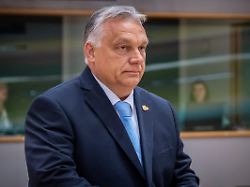Putin’s “Trojan Horse”
Can Hungary be kicked out of the EU?
By Kevin Schulte
November 10, 2023, 8:02 p.m
Listen to article
This audio version was artificially generated. More info | Send feedback
Hungary apparently no longer has any interest in the Western world. Prime Minister Viktor Orban meets with Putin and uses Ukraine aid for a blackmail maneuver. He can afford it because NATO and the EU only have limited resources to keep Hungary under control.
When the heads of state and government of the EU countries meet in Brussels, things get lonely around Hungarian Prime Minister Viktor Orban. French Head of State Emmanuel Macron, Federal Chancellor Olaf Scholz, Commission President Ursula von der Leyen & Co. greet each other in a friendly manner and take selfies with each other. Meanwhile, the Hungarian Prime Minister stands apart from the others, all alonehands in his pockets.
The scenery from the EU summit at the end of October is symbolic of Hungary’s role within the Union. Prime Minister Orban has maneuvered his country into an outsider role, primarily because of his Russia-friendly policies.
His meeting with Kremlin chief Vladimir Putin on October 17 in Beijing may have finally been the final straw. Orban defended the appointment, justifying himself by saying that he was pursuing a “peace strategy”. He is “proud” of that.
His counterparts in the EU see it differently. For Dutch Prime Minister Mark Rutte, shaking hands between Orban and Putin was “tasteless.” Luxembourg’s outgoing head of government, Xavier Bettel, spoke of a verbal “stink finger”.
Orban undermines the EU
Orban says the meeting further isolated Hungary within the EU Andreas Bock, Hungary analyst at the European Council on Foreign Relations think tank, in the ntv podcast “Learned something again”. “Orban is still considered a strategic ally of Putin and is currently relying on weakening support for Ukraine in Europe. In many ways he is undermining the unity of the West and, above all, the EU’s ability to act.”
Hungary’s head of government has concluded further energy agreements with Russia, is trying to limit or completely block aid to Ukraine, and is publicly calling on Brussels to lift the economic sanctions imposed on Moscow.
But Hungary has been charting its own course in the EU not just since Putin’s troops invaded Ukraine. Decisions have been regularly blocked and rules broken for a long time. The EU also accuses the country of not adhering to the rule of law and failing to initiate necessary reforms. That is why billions in payments that Hungary is actually entitled to from the European budget have been frozen.
Hungary obviously doesn’t want to wait any longer for the payment. Orban seems to be using every means possible to force the payments to be released. Most recently, according to reports from EU diplomats, he is said to have made approval for support for Ukraine dependent on whether Brussels paid out the frozen funds or not.
Putin meeting? “Additional shocking moment”
The situation within NATO is similarly complicated. Orban’s meeting with Vladimir Putin even prompted an emergency meeting of NATO ambassadors. Hungary’s NATO allies have “legitimate security concerns,” says expert Bock. Orban’s meeting with Putin was an “additional moment of shock”. “Then people thought again about whether Orban’s Hungary was actually a kind of Trojan horse within NATO.”
You should separate yourself from a “Trojan horse” before the enemy climbs out of hiding and starts his attack. Voices are getting louder in the EU and NATO to throw Hungary out – but that is not possible on the basis of the existing contracts, says Andreas Bock. The following applies to both the EU and NATO: member states can only leave voluntarily. And Hungary has no interest in that. “As a NATO member, the country benefits from collective security. Hungary can take part in multinational military exercises and, of course, Hungary has a certain diplomatic influence as a member of the most powerful military alliance internationally.”
The situation is similar with the EU, Bock makes clear in the podcast. “Hungary needs EU funds and wants to enjoy the benefits of the single market, so leaving is not an option.”
Suspension proceedings unlikely
The EU’s most powerful lever would be an Article 7 procedure. This can be initiated “if there is a risk of a serious violation of the rule of law,” as analyst Bock explains. In extreme cases, such a procedure could lead to Hungary losing certain membership rights, including the right to vote in the European Council.
But even such a measure can only be decided unanimously. The EU’s biggest opponents of Hungary would have to convince all remaining EU states that Hungary must be punished. Not a realistic scenario.
The EU’s only practicable lever is therefore to freeze funds in order to put pressure on the Hungarian government. Whether that will work is more than questionable. There is currently speculation that the EU will release some of the frozen funds to Hungary so that in return Hungary will no longer block aid to Ukraine.
Orban’s blackmail maneuver seems to be working. Hungary’s head of government knows that his country cannot be kicked out of the EU. The same applies to NATO. Putin’s “Trojan Horse” is doing a great job.
“Learned something again” is a podcast for those who are curious: Why would a ceasefire probably just be a break for Vladimir Putin? Why does NATO fear the Suwalki Gap? Why does Russia have iPhones again? What small behavioral changes can save 15 percent energy? Listen in and get a little smarter three times a week.
You can find all episodes in the ntv app RTL+, Amazon Music, Apple Podcasts and Spotify. For all other podcast apps you can use the RSS feed.
You have a question? Please send us an email to [email protected]
